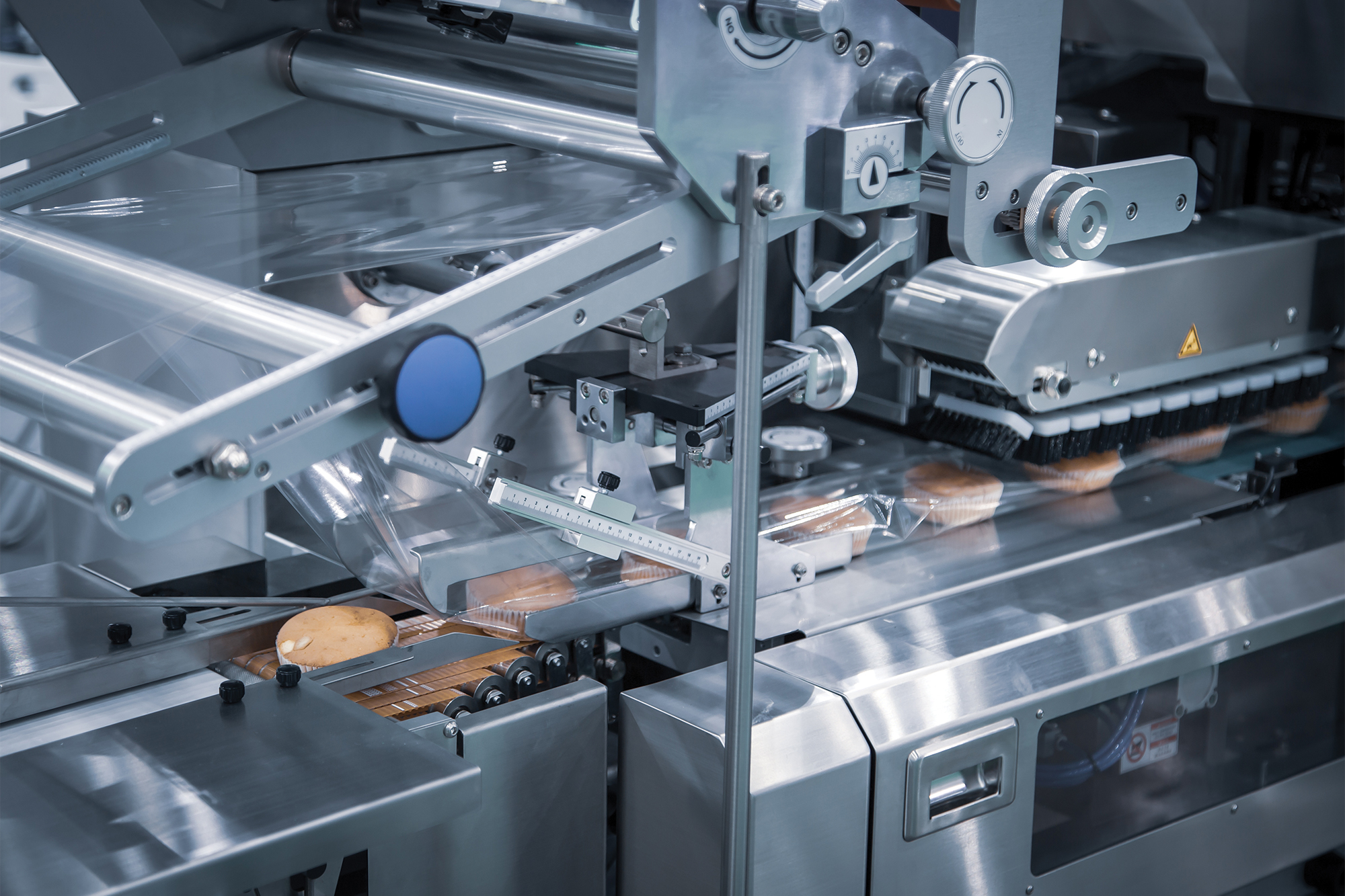
Packaging is a vital step in the production of baked goods. Not only does it prevent moisture and contaminants like germs, bacteria, and insects from spoiling your products, but it also helps them retain their delicious flavors and aromas. The packaging itself allows you to display labeling, information, and advertising, and makes the product much easier to handle. Most commercial and industrial bakery equipment designed for product packaging uses 1mm thick low-density polyethylene plastic bags. These machines typically push the product into the bag or pull the bag over the product. Some bakeries even double-wrap their products with an inner wrap prior to bagging, particularly when producing variety breads. But not all bakery packaging machines are suitable for all types of products. So when you’re searching for automated commercial or industrial bakery equipment to boost your throughput and streamline your operation, it’s important to understand your options.
The two main types of bakery packaging machines
Wrapping machines
As your product passes through a wrapping machine, a length of wrapping is drawn or fed through a reel. Your product is then pushed in, and the ends are folded down and tucked in to surround it in a tube of plastic film. Finally, the ends are sealed with a heat sealer, creating an airtight package that provides maximum protection for your buns, bagels, and breads.
Bagging machines
To begin, a stream of pressurized air is used to blow the bag open within the bagging machine. A scoop then enters the mouth of the bag, expands, and grips it before pulling it from the wicket over your product. The machine gathers the bag’s mouth to form a neck, which is closed with a wire twist-tie or plastic clip. A standard twist-tie used in bagging machines is 4” long, with an all-plastic, all-paper, or laminated plastic or paper covering over the wire. The wire twist-tie is cut from the reel as it attaches to the bag’s neck. A plastic-clip closure, on the other hand, is typically made from resilient polystyrene. It can be imprinted to provide additional information, such as the price, sell-by date, or use-by date. Depending on the size of the clip, it can also create a near-airtight seal that offers better protection than twist-tie closures. In both wire twist-tie and plastic-clip closures, different colors can be used for coding or to help with product tracing when necessary.
How to choose the right bakery packaging machine
Matching your packaging machine to your product should always be your main priority. But there are many other factors to consider when you buy commercial or industrial bakery equipment. These include:
- The price, based on your available budget
- Maximum throughput speed, so you can keep up with demand
- Whether there’s room for excess capacity to accommodate future growth
- Ease of use, which can be improved through customization
- How easy the machine will be to maintain and repair
- Whether the machine has a hygienic design
- The cost of supplies, such as product bags
- The size of the machine compared to your available floor space
- How much waste it’ll produce
- The level of automation you want to achieve
- Pneumatic requirements, such as for air-opened bagging
Specialized equipment retailers also offer customization to ensure your machine precisely meets your baking needs. For example, when you buy bakery packaging equipment from LMC, we can customize your machine based on:
- Product size and thickness
- Product shape
- The orientation and positioning of your products at inlet
- Desired bag fit
- The timing between the pushing or pulling of bags and products
LMC’s range of premium bakery machinery
At LMC, we provide bakers worldwide with high-quality food-grade stainless steel bread bagger and bun slicer machines. Each one uses precision parts made in the US to give you superior performance, and can be custom designed and engineered to suit your operation. We have a comprehensive equipment catalog that provides descriptions, technical specifications, and key features across our range. But here are a few of our most popular automated commercial and industrial bakery equipment options:
Bun baggers
Every aspect of our bun baggers is precisely designed to deliver pristine and consistent bun bagging day-in and day-out. With mechanically distributed drivetrains, fixture-welded frames, matched safety sensors, and CNC-tooled servo rotary bag tables, you can expect smooth, superior production every time.
Bagel baggers
Our bagel baggers process up to 60 bags per minute and can be adjusted for different package sizes, groups, orientations, and more. Their mindful design and manufacturing help your bakery grow with efficient equipment that you can rely on.
Bread baggers
The primary design goal of our bread bagger is to make them intuitive. That way, your team can easily bag outstanding bread at a rate of up to 75 loaves per minute. The boxes, cams, and long-life high-torque pneumatic brake are built for high-speed production, and each machine features category 3 safety controls to protect your staff.
Bun slicers
Our heavy-duty bun and bread slicer machine options ensure your hot dogs, hamburger buns, hoagies, and more are perfectly sliced and ready for bagging. The talented engineering staff at LMC will also meet with you during the design process to maximize machine productivity and efficiency while minimizing key costs.
Enhance your products with industry-leading bakery packaging machines
In the words of culinary king Yotam Ottolenghi: “The first bite is with the eye.” As well as making sure your products maintain the highest quality for the longest time, a well-selected bakery packaging machine makes them irresistible on store shelves. And with LMC’s options for customization, you can tailor your machine to precisely suit your product needs. Get in touch with our expert team today to discuss your vision for the perfect bakery packaging machine and take another step toward your full production potential.
